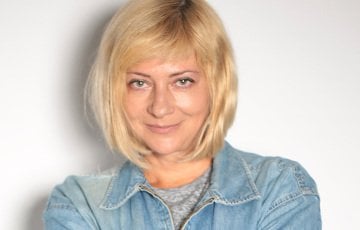Space Is Yours, Time Is Ours
17- Iryna Khalip
- 15.01.2021, 8:03
- 73,110

The country that never sleeps.
First, there were Sundays. There were warm August Sundays and warm September Sundays. When one wondered "why we should turn the revolution into a walk", people were not going for a walk at all.
They prepared for Sunday like for the last battle. They put on clean and comfortable clothes (track pants were better than jeans) - who knows when you'll be back home from this walk? We took the boxes of the old junk out of the shelf, a 20-year-old phone and insert a SIM card so we wouldn't be able to please the chasteners with our correspondence and subscriptions on Telegram channels. We gave the keys and instructions to the neighbours on how and when to feed the cat. When it turned out that the neighbours were also going on the march, we appointed a "cat boss" who, if anything, could take care of all the pets even in the house. We took the children to relatives or friends and let them miss classes the next day if parents didn't come home from their walks.
Then women's marches appeared on Saturdays. Why, in fact, should one miss another day off if one doesn't have to go to work? One should not spend it on the sofa. During the summer, people got used to other habits. Later came Mondays with marches of pensioners and students. They were followed by chains of solidarity during work hours five days a week.
All this time, in parallel to the large-scale marches, there was real partisan life in Belarusian cities. Neighbours recognized each other not only by sight but names and nicknames on telegram chats. The white-red-white windows and balconies appeared not on Sundays, but at any time. The flags that mysteriously appeared between the high-rise buildings went beyond the logic of weekends and workdays. Evening walks of courtyards and neighbourhoods did not depend on whether their participants had to go to work the next day. Even when chasteners hang around the courtyards catching locals, it didn't change anything. It just made the actions even more partisan-like. Now, many chats do not specify the time and place of assembly in advance. Everyone waits. When they get a signal, they run with flags to the gathering place, stand in a chain of solidarity, record a video or take great pictures. By the time the police vans arrive, no one is there. Unless a moustached snowman, suspiciously resembling a three-per cent character from the past, who mockingly greets the baton workers.
The Belarusians have made an unexpected revolution: they started it with time, not space. We have not yet seized the space vans and corteges drive through. We have not occupied the offices where chasteners and officials sit and tremble with fear. We have not yet replaced us them in prison cells. Space is so far yours, three per cent. But the time is ours. It is both figuratively and literally. There is no longer a minute in the day that is free for our cities to fall asleep, and no one in the entire country to conduct a partisan activity at that moment. The country no longer sleeps. We give time for our compatriots to rest, and we come. That's our time.
Earlier, the life slowed down at least in the early morning, as it should be in the gloomy, dark winter. There was no energy to wake up and leave the house, except for going to work after a wake-up call, being half asleep and dreaming of spring and sunshine. Now, people go for walks with flags, build chains of solidarity and wake the slumbering neighbourhood with "Long Live!" in the early morning. It's still two, or even three hours before work. Instead of sleeping, changing the wake-up call for "ten more minutes" several times in a row, people go outdoors.
One can cry out "Malinovka, why can't you sleep? It's cold, dark. It's a long way to spring. Go home, sleep, don't congeal. However, Malinovka stays outdoors. She walks around, sings, hangs flags and ribbons, shapes snowmen, and writes "We will win!" for those who go outdoors later to feel happy, not cold.
Our days begin with surprises for neighbours and passersby, for their neighbourhood and the whole country. It is how the days of the regime end - with fear, anger, and powerlessness. Time is more important than space.
Iryna Khalip, especially for Charter97.org











